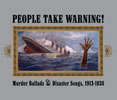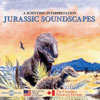 Long before there was tabloid mass media (or indeed any mass media at all), the public taste for sensational tales of calamity and murderous iniquity was slaked by ballad writers who made a living by hawking the sheet music for their overwrought takes on these public tragedies.
Long before there was tabloid mass media (or indeed any mass media at all), the public taste for sensational tales of calamity and murderous iniquity was slaked by ballad writers who made a living by hawking the sheet music for their overwrought takes on these public tragedies.
In the early twentieth century, when gramophones became commonplace, these sheet music sales were supplemented by recordings and, in no time at all, the murder/disaster exploitation song became a mainstay of the recording industry; a position that it maintained well into the late 1930’s. (After that, its popularity waned as people gained greater access to more immediate sensationalism, courtesy of radio and newsreels.)
Although the genre could extend to any event that aroused public horror, sorrow or outrage, the ballad writers were most commonly inspired by train wrecks, floods, fires, boll weevils, murders of pregnant women by their lovers, and the sinking of Titanic… Or, at least, that’s impression one gets from People Take Warning, a comprehensive 3 disc survey of this once thriving genre that came out last year on Tompkins Square Records.
Musically, the collection traverses just about every “folk” genre that was being recorded in the States in the first three decades of the twentieth century – old-time, blues, country, Gospel, Cajun, and even a Yiddish lament (one of the half dozen songs devoted to the Titanic). And the treatment given to their uniformly grim subject matter is no less varied. Take the following three tracks as examples.
The first one is the aforementioned Titanic-inspired Yiddish lament, a wailing evocation of grief that’s almost visceral in its intensity. Contrast this with Barbecue Bob’s “Mississippi Heavy Water Blues”, an unintentionally comic piece of disaster-ploitation in which Bob bemoans the fact that the Great 1927 Mississippi Flood has swept all the womenfolk away. As a result, he can’t find a “sweet mama” to “shake that thing with [him]”. (Historical note: Bob wasn’t even in Mississippi at the time of the flood. According to the liner notes, he was “more than likely in Georgia or New York”.)
Finally, there’s Bob Miller's ode to a 1930 Ohio Penitentiary Fire, which killed 322 inmates. Despite its apparent sincerity, the song is a complete (if entertaining) dog’s breakfast; which combines an incongruously jaunty melody with clunky doggerel, a mind-bogglingly overwrought vignette centred on a distraught mother identifying her son’s charred remains, and a final touchingly humanistic homily that reminds the listener that prisoners are people too.
El Mole Rachmim (Fur Titanik) - Cantor Joseph Rosenblatt
Mississippi Heavy Water Blues - Barbecue Bob Hicks
Ohio Prison Fire - Bob Miller
This wonderful collection comes with eloquent, deal-sealing liner notes from Tom Waits and can be purchased from all good online record emporia.
 Your mission, should you choose to accept it, is to create an album of imagined “field recordings” of dinosaurs. Simple enough? OK, now comes the hard part – get an eminent international sound library devoted to the very serious task of collecting “natural sound sceneries of endangered ecosystems” to release it.
Your mission, should you choose to accept it, is to create an album of imagined “field recordings” of dinosaurs. Simple enough? OK, now comes the hard part – get an eminent international sound library devoted to the very serious task of collecting “natural sound sceneries of endangered ecosystems” to release it.
On the face of it, this might seem like a challenge that would fail at the first pitch meeting, but somehow sound recordist Jean-Luc Herelle managed to pull it off with Jurassic Soundscapes, an album of the speculative sounds of these long extinct beasts which was released on the very "serious" Fremeaux & Associes label. (In the liner notes, however, Fremeaux’s head honcho does admit that it “may at first sight appear to be a little ridiculous”.)
What no doubt helped Herelle get this past any furrowed brows at Fremeaux is the fact that he’s got reputable expert opinion on his side. He's consulted paleontologists who’ve given him the low down on the resonant qualities of the morphologies of various dinosaurs and pointed out that dinosaurs are ancestors of modern-day birds. So Herelle, who’s made a career out of recording birds, has pulled out some of his old master tapes, pitch-shifted them down, remixed them, and – hey presto! – he gives us the sounds of paddling plesiosaurs, chattering archaeopteryxes, and growling tyrannosaurs. Here are some samples:
Excerpt #1 – Plesiosaurs and Rhamphorhynchues at a Triassic lakeside (200 million BC)
Excerpt #2 – A Tyrannarosaurus growls during a late Cretaceous storm (64 million BC)
Regardless of how accurate these are (and we won’t know that till we can punch a wormhole into the Jurassic and send in a binaural mike) the album’s a great guilty “field recording” pleasure and you can purchase it from Aquarius Records or Audio Roots.
In the tradition of Cookie Mongoloid and Muppet Bolt, here's Ernie and Bert covering "A Divine Proclamation to End the Present Existence" by Dutch hyper-speed metal spasmoids Last Days of Humanity. (via WFMU)
 The mbira is the Zimbabwean version of that most African of instruments, the thumb piano. Consisting of a box or gourd on which tuned tongues of metal are mounted, the mbira is played by plucking the tongues which produce a hollow metallic chime. In its country of origin, it is the centerpiece of a style of ritual trance music that uses repetitively plucked phrases to call forth ancestral spirits. An example of this type of playing can be heard in the clip below by “scandalous” mbira virtuoso, Stella Chiweshe. (Chiweshe is scandalous because she is a woman and mbira music in Zimbabwe is traditionally regarded as the exclusive province of men.)
The mbira is the Zimbabwean version of that most African of instruments, the thumb piano. Consisting of a box or gourd on which tuned tongues of metal are mounted, the mbira is played by plucking the tongues which produce a hollow metallic chime. In its country of origin, it is the centerpiece of a style of ritual trance music that uses repetitively plucked phrases to call forth ancestral spirits. An example of this type of playing can be heard in the clip below by “scandalous” mbira virtuoso, Stella Chiweshe. (Chiweshe is scandalous because she is a woman and mbira music in Zimbabwe is traditionally regarded as the exclusive province of men.)
Here in the West, the mbira is mostly regarded as an exotic novelty; a piece of plunkable Africana that can be picked up for a couple of bucks at any weekend market frequented by dreadlocked hippies. Some serious musicians (and Trent Reznor) have dabbled with it but, to date, the only Occidental to seriously explore its potential is Richard Crandell.
A jazz guitarist who’s performed with the likes of Leo Kottke and John Fahey, Crandell learnt the mbira from a master – Ngoni Nakombe, who plays in the band of Zimbabwe’s biggest “star”, Thomas Mapfumo. In the process, he no doubt gained a familiarity with the traditional style and its emphasis on repetition, and this has found its way into his delicately hypnotic minimalist compositions, whose reference points stretch from Terry Riley and Phillip Glass to CPE Bach and Japanese music.
Richard Crandell - Etude In E
Richard Crandell - Japanese Lullaby
So far he’s produced two albums in this vein, Mbira Magic and his latest, Spring Steel (from which the two above tracks are taken). Both were released on Tzadik, and though they may not be as restlessly kinetic as more traditional fare, I’m sure the ancestors would still approve.